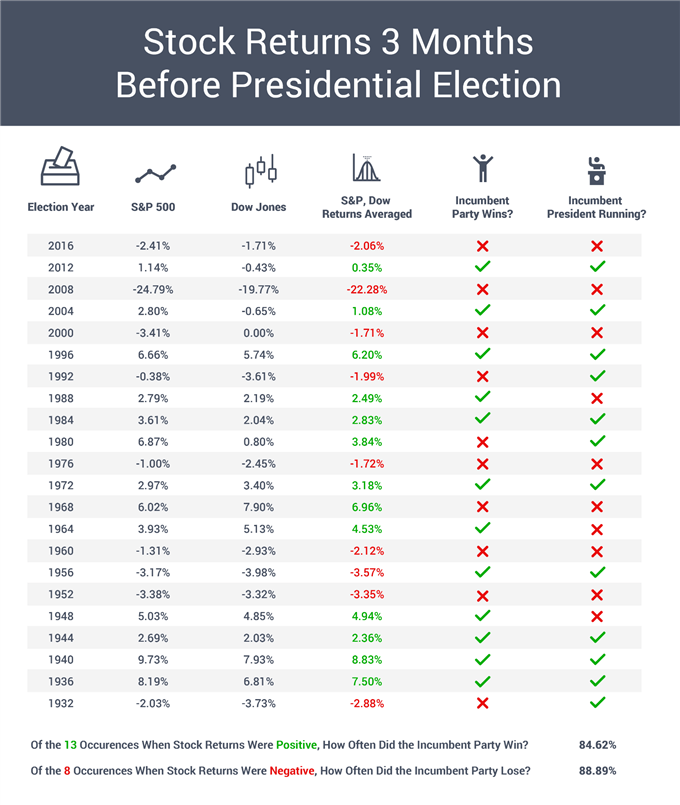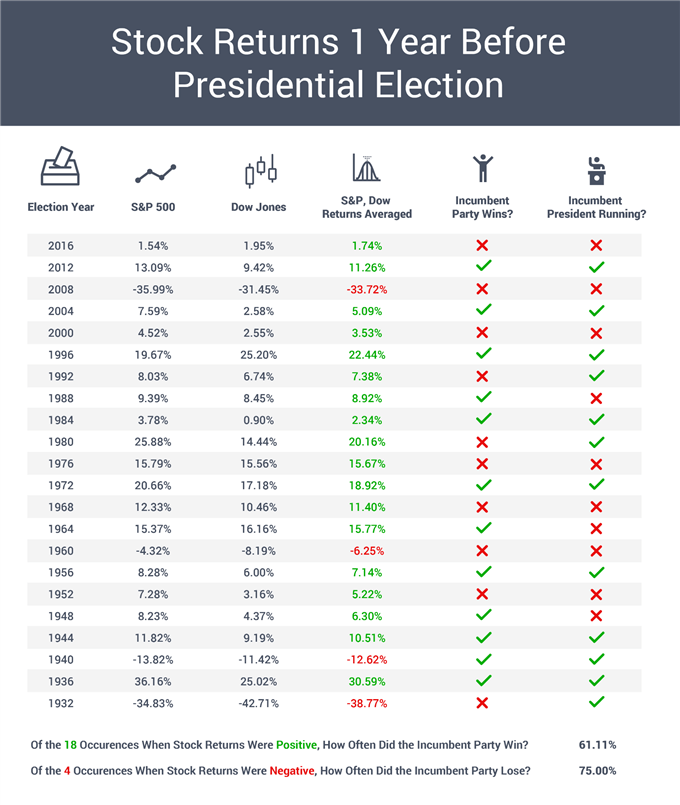[ad_1]
How Can Stock Markets Impact US Presidential Elections?
- How do the Dow and S&P 500 affect election voters?
This study analyzes the index 1 year and 3 months before the election
Will voters react to stock performance as the election approaches?
Introduction
Many factors can affect the outcome of a US presidential election, such as: B. The economy, voters’ background, voter turnout, swing state results, and more. But what about stock market returns?
This is a special report that analyzes the performance of the S&P 500 and Dow Jones before 22 presidential elections since 1932. I’ll look at how the two indices performed on average one year and three months before the election, and compare their returns to whether the incumbent party wins.
Background
First, let’s first consider how stock performance affects the election. Stock prices represent ownership of a small fraction of a company and are influenced by supply and demand forces that reflect the expected fate of that particular company. Some stocks pay you dividends and give you voting rights at shareholder meetings. But most importantly, you have the right to sell the stock in the future.
If the stock price rises, the holder can make a profit by selling the stock at a higher price than it received. If investors believe a company can generate more returns in the future, driving demand for its shares, prices tend to rise. There can be specific and systematic forces that determine the direction a stock can take. This article focuses on the latter, or how the overall shape of the U.S. economy drives the stock market.
The S&P 500 and the Dow are stock indexes that give different weights to key economic sectors such as information technology, real estate and energy. If their returns are positive before the election, it may be because investors expect the underlying companies to make more profits in the future. This could be due to a positive outlook for economic growth, which could increase the chances of the incumbent party retaining power.
Conversely, if stock returns are negative ahead of the election, it may be due to a more pessimistic growth outlook. If this is the case, one can reasonably assume that parties running for re-election may be at greater risk of losing office. Of course, this will only happen if voters generally appreciate the stock market’s performance. This is a limitation of this study and will be discussed in more detail at the end.
S&P 500, Dow Jones Returns 1 Year Before Presidential Election
In 18 of 22 elections since 1932, the S&P 500 and the Dow have averaged positive returns in the year leading up to a presidential election. Of the 18 cases, the incumbent won 11 times, or about 61.11 percent. The other four stock market returns were all negative. Of these, the incumbents lost three times, or about 75% – see table below.
S&P 500, Dow Jones Returns 3 Months Before Presidential Election
In this study, what happens when the time horizon changes from 1 year before the election to 3 months? In this case, 13 of the 22 events were positive stock returns. In 11 cases, or 84.62 percent, the incumbent won. Meanwhile, there were 8 instances of negative stock returns. The veteran in this case lost 7 times, with a failure rate of about 88.89%.
| Change in | Longs | Shorts | OI |
| Daily | 10% | -11% | 1% |
| Weekly | -10% | 17% | -1% |

Conclusion
In short, 3-month data appears to provide more consistent results than 1-year data. For the most part, stock market performance before the election appears to be tied to whether the incumbent party wins. It is important to note that correlation does not imply causation. It may be that 3 months before the election, voters place more value on stocks as they consider current events more carefully to prepare to vote. This study has some limitations.
Starts in:
Live now:
Jul 05
( 23:07 GMT )

How does politics move the market every week?
How do other traders’ buy/sell bets affect the price trend?
Register for the webinar
Join now
Webinar has ended
Study Limitations
The choice of sample chambers is limited to 22, and more observations tend to increase the accuracy of the results.
The data does not take into account how much voters value stock returns around the election. According to Gallup, as of June 4, 2020, about 55% of Americans said they owned stocks.
The data does not take into account the magnitude of gains and losses for stocks around the election. That is, do higher stock returns make incumbents more likely to win, and vice versa?
[ad_2]
